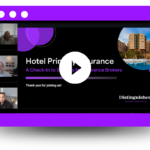Winter Weather Preparedness: Don’t Leave Your Business Out in the Cold
Old Man Winter is unpredictable and blows in a number of challenges that need to be addressed ahead of time in order for a business to effectively mitigate and minimize risk – from property damage to employee illness or injury, and even business closures. Following is some practical information to help protect your business and your most important asset – your employees.
Know Your Winter Weather Exposures
Where your business operates will affect the type of exposures your business faces. For example, Southern states might need to address flooding, high winds, and ice storm conditions. In the North and Midwest, snow is a big concern. Look at what weather emergency might strike your area and make a list of how your local weather might put your small business at risk and what needs to be done to minimize that risk. Are your pipes protected from freezing temperatures, for instance? Would an ice storm down power lines in your area? Would a large snowfall make it difficult for employees to get to work? Complete a full risk assessment so that you can put into place the appropriate risk management measures.
Before the Storm
- Implement an emergency preparedness plan. Make sure all employee contact information is current. Designate a few reliable team members as emergency contacts. During evacuation consider your phones lines-redirection to cell phones, answering service or Google Voice could be critical. Also, have key employees sign up for local text alerts and warnings and download weather apps relevant to hazards in your area to their phones. Understand the National Weather Service (NWS) terms used to describe changing weather conditions. Create an emergency supply kit.
- Ensure your plan includes exactly what will happen if an emergency strikes. How will you communicate with your team during a weather event? How will you coordinate with your snow removal vendor? What measures do you have in place to keep your staff, customers or tenants safe during a weather event? What procedures are in place to restore electrical services? If snow and/or ice prohibit access to your business, are there alternative ways to enter your premises? This and so much more should be detailed in the plan.
- Train your team regularly on emergency preparedness.
- Take preventative steps to keep your business open during bad weather. One of the main reasons businesses have to close during a winter storm is due to power failures. Ice, high winds, and snow can all down power lines. Look into having a backup power supply to keep your business operating. Consider your computer system and terminal set-up, too. Even if you have a backup source of electricity, do you have a backup method for connecting to the Internet and transmitting payment information?
- Check your insurance for winter weather coverage. For example, not all property policies cover floods, so check if you need additional coverage. Also, business interruption coverage can protect your business when revenues are lost due to unavoidable closures or utility service disruption. Are you properly covered for these types of losses?
During the Storm
- Heaters, snow blowers, generators, and cold-weather equipment should be located where they are most likely to be used.
- Keep driveways, walkways, and doorways clear of snow and ice.
- Open water faucets slightly to let them drip in order to keep water flowing through pipes vulnerable to freezing.
- Names and phone numbers of your heating contractor, plumber, fire department, insurance agent, and building owner should be easily accessible.
- Have someone check indoor temperatures should your place of business be vacant for long periods of time.
For more detailed information to help ensure your business is winter-weather-prepared, click here.




